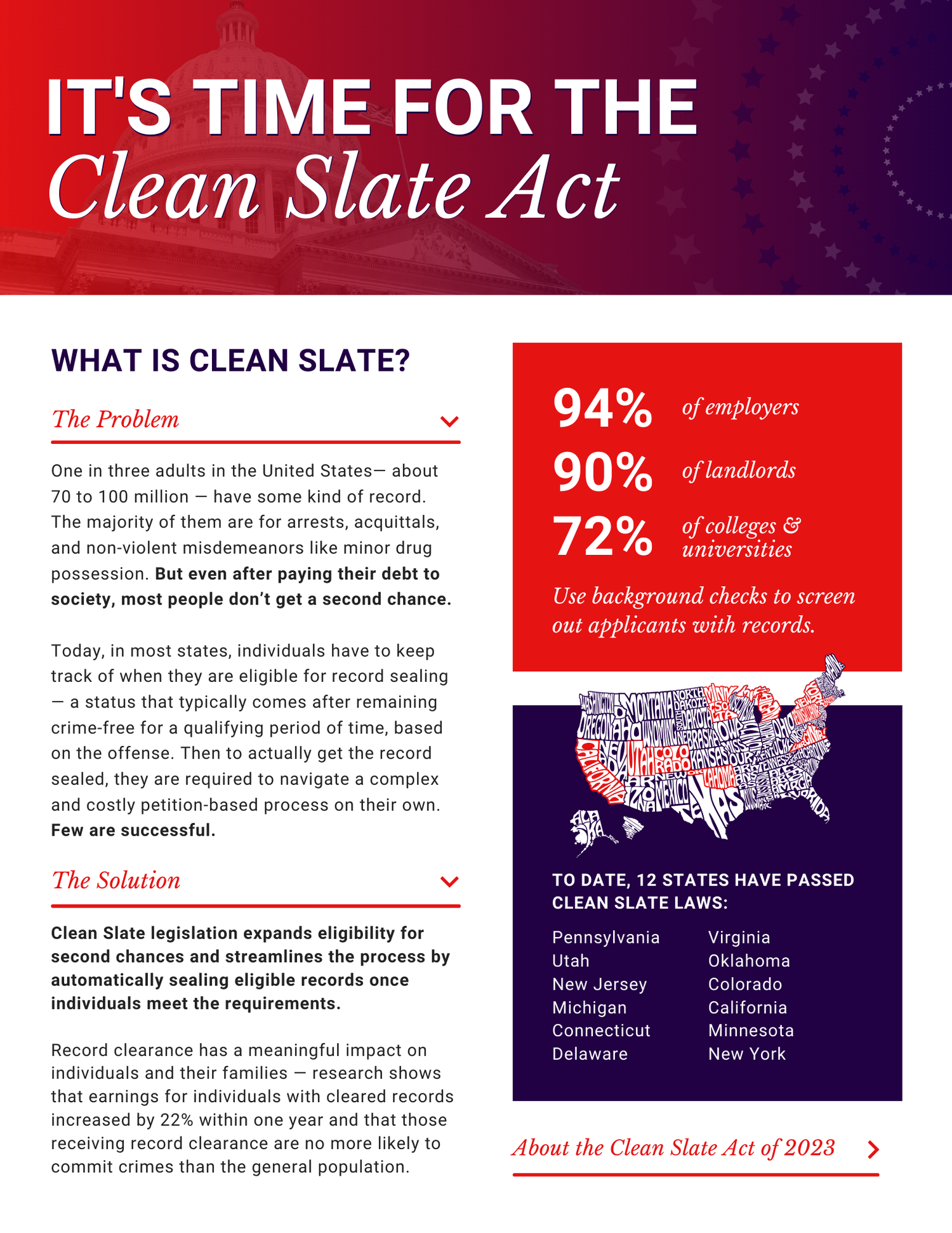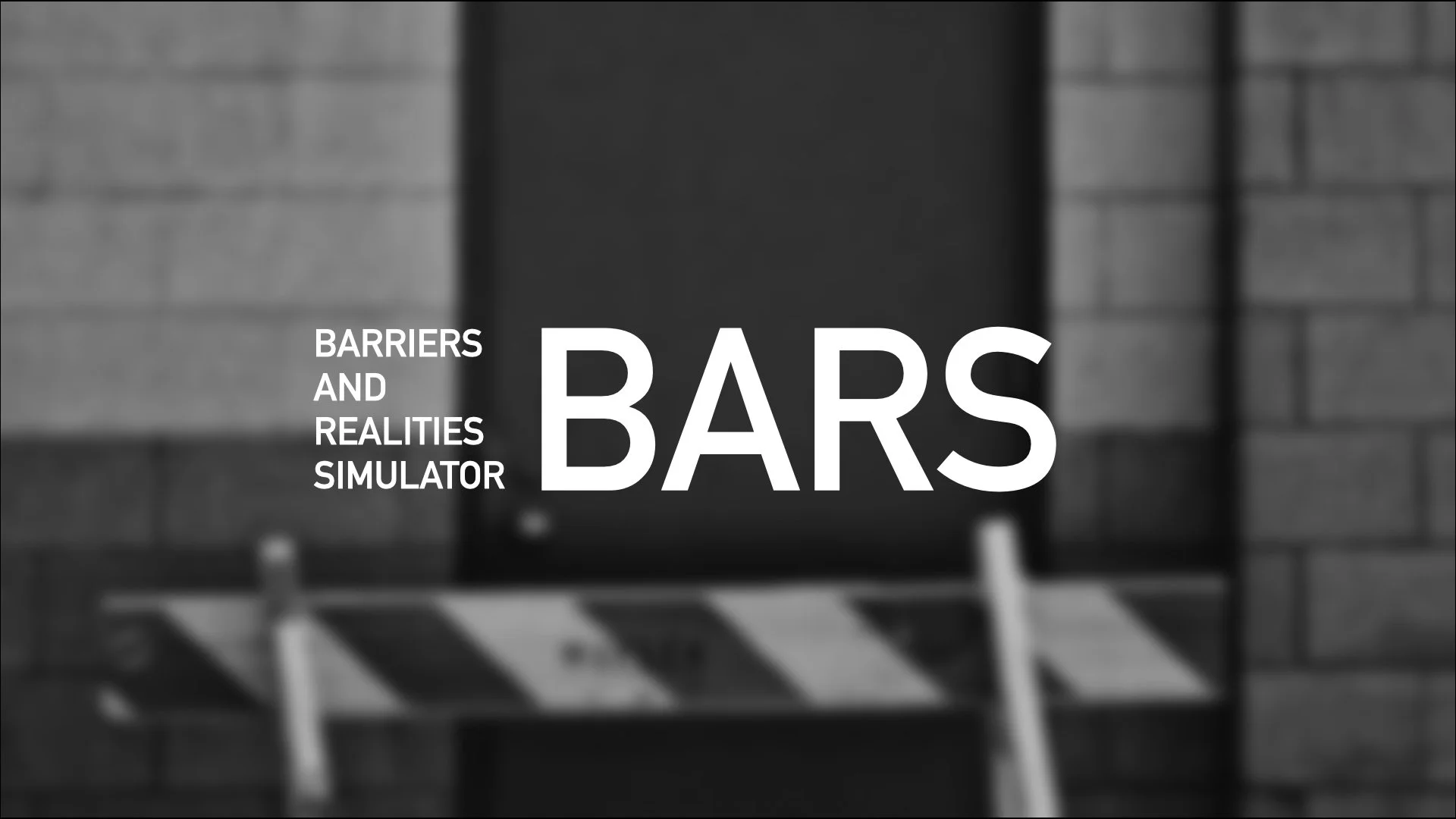It's Time For
The Clean Slate Act

Key Messages
H.R. 2930, The Clean Slate Act…
The Clean Slate Act recognizes the talent, skills, and potential of individuals who meet the requirements, ensuring they can continue contributing to their communities and workplaces.
By sealing their records, people are empowered to fully engage in the workforce, pursue higher education, and achieve financial stability.
When individuals have the opportunity to move forward without the burden of a past conviction, they are better positioned to support their families and invest in their communities.
The Clean Slate Act helps families gain stability by ensuring parents can fairly compete for better job opportunities, housing, and educational resources for their children.
The Clean Slate Act helps reduce the likelihood of recidivism by ensuring individuals have a clear path to reintegrate into society and the workforce.
Public safety is strengthened when individuals have a real chance to succeed - making it possible for them to stay on a positive trajectory and contribute to safer, more resilient communities.
Having a job is critical for breaking the cycle of crime and keeping communities safe. Employment is among the strongest, evidence-based solutions for public safety.
The Clean Slate Act is about unlocking the potential of millions of people who have already proven their commitment to moving forward.
By removing barriers, we allow individuals to apply their talents, skills, and experiences to jobs and community leadership roles, creating a ripple effect of positive change that benefits society as a whole.
The Clean Slate Act would open doors for individuals to fully participate in the economy, leading to increased workforce participation and higher earning potential.
As more people gain access to meaningful employment, local businesses benefit from a broader pool of skilled workers, while the overall economy grows through increased consumer spending and tax contributions.
What CSI is saying…
The Clean Slate Initiative (CSI) celebrates the introduction of the Senate companion bill to H.R. 2930, The Clean Slate Act of 2023, sponsored by Sens. Rand Paul (R-KY) and Bob Casey (D-PA). The legislation represents a major bipartisan achievement, standing out amidst the heightened partisanship of election season.
In introducing the Senate companion bill to the Clean Slate Act, Sens. Bob Casey and Rand Paul showcase a deep understanding of the far-reaching benefits of Clean Slate legislation. Beyond offering individuals a fair chance at redemption, Clean Slate policies catalyze economic growth and bolster our workforce.
By removing barriers to employment and opportunity, Clean Slate legislation enables individuals to participate in our economy, driving growth and prosperity fully. So far, states have led the charge on automatic record sealing, and it's encouraging to see momentum building in Congress. Together, we can break down barriers to opportunity and ensure that those who meet the requirements and earn a second chance have a fair shot at building a better future for themselves and reaching their potential.
There is currently no process for sealing federal arrest or conviction records, and the collateral consequences of having a record can be devastating for individuals, families, and communities. According to the Federal Criminal Case Processing Statistics Data Tool published by the Bureau of Justice Statistics, from 1998 - 2022,
- Over 1,000,000 people have been convicted of non-violent federal offenses;
- The federal government arrested but declined to prosecute more than 700,000 people; and
- Over 200,000 people have been prosecuted for a federal offense and not convicted.
The Clean Slate Act of 2023 proposes reforms that, if enacted, would unlock opportunities for individuals with records while enhancing public safety and economic prosperity. Key provisions include:
- Automatic record-sealing for federal convictions of simple possession and non-violent offenses involving marijuana.
- Automatic sealing of arrest records within 180 days for individuals who were acquitted, exonerated, or had charges dismissed or never filed.
- A new petition process allowing individuals to request the sealing of records for other non-violent offenses not automatically sealed.
- Protections for employers from liability related to the misconduct of employees tied to sealed conviction records.
- The bill would not allow the sealing of sex offense records, records related to terrorism, treason, or other national security-related offenses, and records for people convicted of other violent crimes.
The federal proposal follows several years of sustained bipartisan momentum at the state level, with 12 states enacting Clean Slate legislation since 2018. As a result, over 14 million people are on the path to having a fully cleared record, according to CSI estimates.
Pennsylvania, Sen. Casey’s home state, was the first in the country to pass a Clean Slate in 2018. In Sen. Paul’s home state of Kentucky, a broad coalition of community partners continues to build support for Clean Slate legislation that could be considered during next year’s legislative session.
Additional Information and Resources
- CSI Resources for Journalists and Media Outlets, cleanslateinitiative.org/media
- CSI Federal Webpage, cleanslateinitiative.org/federal
- CSI Data Dashboard, cleanslateinitiative.org/data#dashboard
- CSI Frequently Asked Questions, cleanslateinitiative.org/faq
On the pervasive impact of arrest and conviction records.
A significant majority of employers (94%), landlords (90%), and educational institutions (72%) conduct background checks, leading to the widespread exclusion of people with records from opportunities to support themselves and their families and improve their lives.
An arrest or conviction record reduces a job seeker’s chance of getting a callback or job offer by nearly 50 percent.
There are more than 42,000 state and federal regulatory restrictions that limit the ability of people with a record to access meaningful opportunities to build a better life.
Less than 10% of people get their records cleared within five years of becoming eligible.
Nearly half of children in the United States live in households where a parent or adult has faced a criminal charge, been convicted of a felony, or spent time in prison. This is roughly 33 – 36.5 million children.
Record sealing expands the skilled workforce, allowing employers to fill positions that would have previously excluded candidates with past arrest and conviction records. Research indicates that wages can increase by over 22% in the first year following record clearance. Workers, and in turn families, benefit from meaningful and appropriate employment.
The broader societal and economic impacts of excluding individuals with records from the economy are profound. The U.S. economy loses an estimated $78-87 billion annually due to reduced workforce participation by individuals with records.
Research also shows that when people have stable, good-paying jobs, they are much less likely to engage in illegal behavior.
The Clean Slate Act would...
Automatically seal federal records for people convicted of simple possession or any federal non-violent offense involving marijuana.
Require, within 180 days, the automatic sealing of arrest records and other related records for individuals that have been acquitted, exonerated, or never had charges filed against them.
Create a new procedure that allows individuals to petition the United States Courts to seal records for nonviolent offenses that are not automatically sealed.
Authorize district courts to appoint a public defender to help indigent petitioners file and successfully seal their records.
Require individuals to wait two years to re-petition the court if their initial request was denied.
Protect employers from liability for any claim arising out of the misconduct of an employee if the misconduct relates to a sealed criminal record.
The Clean Slate Act
would not ...
Allow sealing sex offense records.
Allow those convicted of terrorism, treason, or other national security-related offenses to seal their records.
Allow for the sealing of records if a petitioner has been convicted of other violent crimes.

Download
the Clean Slate Act Fact Sheet
Build the suspense! Download and share one of our story graphics as you travel to D.C or your meetings to let your friends, families, and followers know you’re en route to advocate!
QUICK FACTS & STATS
- 1 in 3 adults in the United States - 70 to 100 million people - have an arrest or conviction record that limits their ability to work, obtain housing, and engage in civic life. Having a record, even an arrest record, is a significant barrier to economic mobility.
(FBI III) - Less than 10% of people get their records cleared within five years of becoming eligible. (Paper Prisons Initiative)
- America now has roughly the same number of people with arrest or conviction records as it does four-year college graduates. (National Center for Education Statistics)
- 94% of employers use background checks when hiring. (National Consumer Law Center)
- 90% of landlords use background checks on prospective tenants. (National Consumer Law Center)
- 72% of colleges and universities use background checks on prospective students. (Researchers from the University of Minnesota)
- The estimated loss in gross domestic product every year resulting from shutting people with records out of the workforce is $78 - $87 billion. (Center for Economic and Policy Research)
- There are more than 42,000 state and federal regulatory restrictions that limit the ability of people with a record to access meaningful opportunities to build a better life. (National Reentry Resource Center)
- On average, people who received record clearance were 11% more likely to be employed and saw an over 22% increase in income within one year. (Researchers at the University of Michigan)
- An arrest or conviction record reduces a job seeker’s chance of getting a callback or job offer by nearly 50 percent. (Research published in American Academy of Political and Social Science)
Since 2018, 12 states have passed Clean Slate legislation.
- Pennsylvania (2018)
Utah (2019)
New Jersey (2019)
Michigan (2020)
Connecticut (2020)
Delaware (2021)
Virginia (2021)
Oklahoma (2022)
Colorado (2022)
California (2022)
Minnesota (2023)
New York (2023)
14 million people are eligible to receive full record clearance in the 12 states that have passed Clean Slate legislation.
- 37% of eligible people are people of color.
- A total of 15 million people are eligible for full or partial clearance in those states.
Take action to support the federal Clean Slate Act
GET SOCIAL
Download and share one of our premade graphics to your social channels with one of our suggested captions, or create your own!
Caption It
Here are suggested captions to help you caption your post.
CSI believes that those most impacted by incarceration and criminalization should be central in deciding and implementing remedies that improve their lives. Our work is rooted in the experience of directly impacted individuals.Did you know that 12 states have led the way and passed legislation that meets @cleanslateinitiative’s policy minimums?
These policies have paved the way for more than 14 million people to receive full record clearance in the 12 states that have passed the legislation. Currently, there is no standard process for the clearance of federal records. Now it’s time for Congress to do their part!
The Clean Slate Act would create the first-ever standard process for federal record clearance, expanding access to #secondchances by automating the clearance of eligible records, and help fiscally support state efforts to implement #CleanSlate policies.
By passing federal Clean Slate legislation, Congress can give people in America a #secondchance to live productive and fulfilling lives.
The Clean Slate Act would create the first-ever standard process for federal record sealing, expanding access to #secondchances by automating the clearance of eligible records, and help fiscally support state efforts to implement #CleanSlate policies.
The Clean Slate Act will remove barriers that hinder education, employment, housing, and public safety for people living with a federal record. It will also create the first-ever standard process for federal record clearance, providing a pathway to rehabilitation, reintegration, and the restoration of rights at the federal level.
Visit cleanslateinitiative.org/federal to send a letter to your representative calling for the support of #SecondChances and #CleanSlate automatic record sealing.


Support Clean Slate
Your voice and action matter. Share your story to amplify the importance of second chances, or make a donation to help expand access to automated record sealing and opportunity for millions.
.avif)



.png)
.png)
.png)